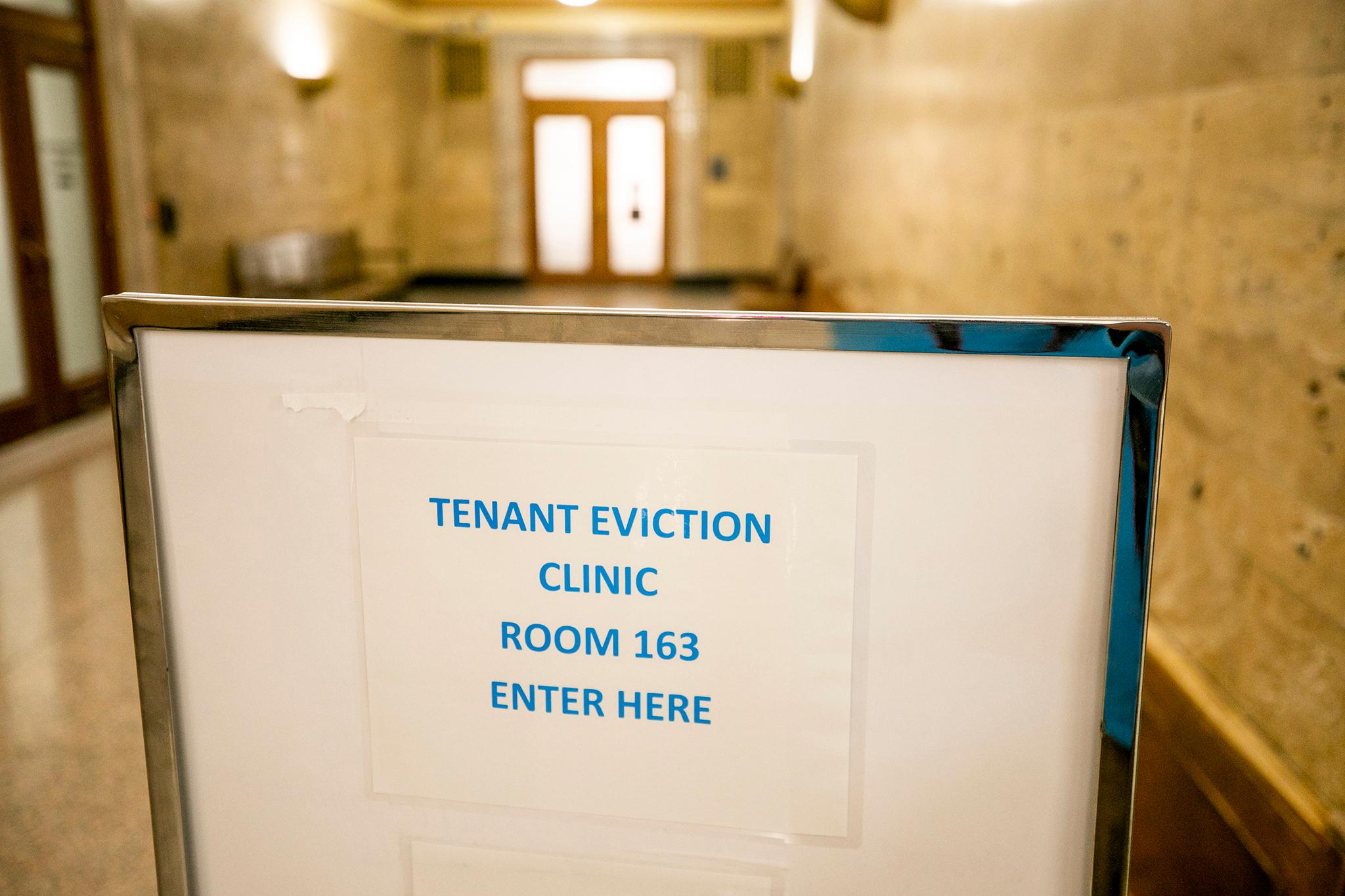As Mayor Mike Johnston attempts to get 1,000 people off the streets and into transitional shelters, the number of people at risk of being evicted and facing homelessness is only growing.
In September, Denver saw the second-highest number of eviction filings in county court in any month in at least the past five years. A total of 1,174 households faced losing their homes through the legal system.
The highest number of monthly filings came the previous month, in August, when 1,196 households were at risk of being removed from the homes they rented.
In the first eight months of 2023, Denver already surpassed last year’s eviction filings by 341 and is on track to break the record of annual eviction filings of any year since at least 2008. And it could get worse next year since the overall amount of money dedicated to preventing evictions is dropping.
“We’re, unfortunately, headed toward potentially more than 12,000 eviction filings this year,” said Melissa Thate, the housing stability director for the city’s Department of Housing Stability (HOST). “That is certainly an unprecedented number.”
The hike in eviction filings is happening even as the city offers rent and utility assistance, an eviction legal clinic in Room 163 at the City and County Building, and free eviction legal assistance for some people facing eviction.
Mayor Mike Johnston has dedicated $12.6 million to eviction prevention, four times more than the city did before the pandemic.
“Even as federal funding for rental assistance expires, this funding represents a significant increase in the city’s support for this intervention,” the mayor’s spokesperson Jordan Fuja told Denverite.
The Community Economic Defense Project has said that the city needs to dedicate closer to $55 million to eviction prevention to end evictions in Denver.
While Johnston has increased city money dedicated to stopping evictions, the overall amount being spent will be dropping from roughly $21.4 million by nearly $9 million. That’s because the federal government has not renewed funding for the Emergency Rental Assistance Program that has been in effect during the pandemic and has helped keep many people housed.
That federally funded program will end this year, Thate said.
“This continues to be a really scary time for the city,” said Zach Neumann, head of the Community Economic Defense Project. “Every month we’re evicting it seems like a record or close to record number of people for that month. And the downstream effects are really, really bad.”
Being evicted — and even facing eviction — is associated with higher mortality rates and both physical and mental health issues, according to the Centers for Disease Control and Prevention.
The process has a long-term economic impact on households and a person’s future ability to rent. Children, in particular, are vulnerable.
“Families that are evicted see marked declines in physical and mental well-being,” Neumann said. “Kids performance in school dramatically falls. The ability to get or retain a job is severely impacted. When you evict folks from their homes, they suffer. And we’re doing it at historic rates.”
In August, Denverite told the story of Darrius Davis, a 25-year-old who died by suicide as sheriff deputies carried out an eviction, and how the systems in place did not protect him and many others. Through that reporting, Denverite learned that the city does little to track the mental and physical health consequences of eviction or the outcomes of people who lose their homes.
Here’s how eviction filings work.
Eviction filings happen after a landlord has warned a tenant to fix a problem or else go to court and before the Sheriff’s Department removes a household and the people’s belongings.
The landlord files paperwork with the court, starting a legal process that can result in people losing their housing.
Not all of those cases lead to a Sheriff Department-ordered eviction, and this number does not take into account the households who leave their homes after the first sign of eviction but before a case goes to court.
While the city has ways of tracking eviction filings, completed evictions and both sheltered and unsheltered homelessness, there is no formal tracking of the many people who lose their homes who don’t go through the court eviction process.
The government also doesn’t have ways to count people who lose their homes from short-term rentals like those who stayed at the city-shuttered Regis Motel or who subleased from roommates or stayed with family or friends and were kicked out.
In his 2024 city budget, Mayor Johnston has repeatedly said he wants to stop no-payment evictions, though he is dedicating more money to temporary transitional housing — $48 million — than eviction prevention.
“While supporting people who are currently unhoused is an urgent, immediate need, Mayor Johnston remains focused on stopping the pipeline of people entering homelessness in the first place,” Fuja, a spokesperson for the mayor’s office, told Denverite.
In addition to increasing the portion of the city budget dedicated to eviction prevention, the mayor will be spending $2 million in city money on free eviction defense legal services for Denverites.
“If you can’t pay your rent, you can have the best legal representation in the world, you’re going to be evicted,” Neumann said. “So until either housing prices come down dramatically, or we make a very, very significant financial commitment to keeping people in their homes, we will continue to see very high numbers of evictions in Denver.”

Part of bringing home prices and rents down is building more income-restricted housing.
“Mayor Johnston set an ambitious goal to create and preserve up to 3,000 units of affordable housing in 2024 and reforming the permitting process to make building affordable units easier and faster,” Fuja wrote.
That’s roughly 5% of the 60,000 units of income-restricted housing former Denver Housing Authority head David Nisivoccia told Denverite the metro needs. And he says that number is only growing.
“In a world where housing costs are like 50% of a lot of people’s pre-tax income, any emergency can lead to eviction: a flat tire, an unexpected medical bill, an hours reductions at work,” Neumann said. “So we either support people’s housing when they face those emergency moments, or we’re going to continue to see these numbers go up.”
Johnston sees a possible fix through collaboration.
“Mayor Johnston is committed to working with state, federal and philanthropic partners to increase funding to meet the total need,” Fuja said.
Correction: This story originally misstated that the latest eviction filings were from August. They were from September. We regret the error.












